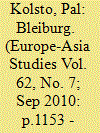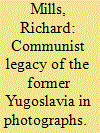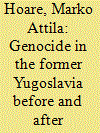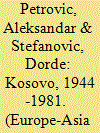|
|
|
Sort Order |
|
|
|
Items / Page
|
|
|
|
|
|
|
| Srl | Item |
| 1 |
ID:
098357


|
|
|
|
|
| Publication |
2010.
|
| Summary/Abstract |
In a study of historical myths in South Eastern Europe in 2005 I identified four different types of mythologies, one of which was the myth of martyrdom (Kolsto 2005). I pointed out that while nations most of the time celebrate their victories and moments of glory, occasionally their great tragedies and defeats are also embellished into mythical stories and made into objects of collective commemoration. As a prime example of mythologised defeats in the history of the Balkan peoples I-like many other authors-singled out the battle of Kosovo in 1389, an event which in contemporary Serbian consciousness has come to be regarded as the moment when the Serb nation chose righteousness and truth over earthly power (Vuchinich & Emmert 1991; Anzulovic 1999, pp. 11-22; Judah 2000).
|
|
|
|
|
|
|
|
|
|
|
|
|
|
|
|
| 2 |
ID:
098360


|
|
|
|
|
| Publication |
2010.
|
| Summary/Abstract |
It is impossible to travel through the former Yugoslavia without constant reminders of the region's recent past. Socialist-era buildings retain their prominent city centre locations in the capitals of all of the successor republics, whilst the countryside remains littered with monuments honouring the achievements of Tito's victorious Partisan Army. There is also no escaping Yugoslavia's violent dissolution, with many villages, towns and cities still struggling to come to terms with the physical damage inflicted by war. The following photographic selection attempts to offer a brief insight into those relics of the past which, through their physical presence, continue to have an impact upon the present day. These photographs were taken by the author between 2007 and 2009.
|
|
|
|
|
|
|
|
|
|
|
|
|
|
|
|
| 3 |
ID:
098359


|
|
|
|
|
| Publication |
2010.
|
| Summary/Abstract |
Yugoslavia was the scene of genocidal and other crimes of mass murder while under the occupation of the Axis powers during World War II in the period 1941-1945. Following a period of nearly half a century under communist rule, 1945-1990, the region was again the scene of mass murder in the period following the break-up of the Yugoslav state, 1991-1999. The two episodes are linked both causally and thematically.
|
|
|
|
|
|
|
|
|
|
|
|
|
|
|
|
| 4 |
ID:
098353


|
|
|
|
|
| Publication |
2010.
|
| Summary/Abstract |
In the aftermath of the demise of the three communist federations, Western scholars have engaged in a debate on the role of ethno-federal arrangements in the process of disintegration. Some, such as Snyder (2000) and Bunce (1999), argue that the communist rulers 'created their own grave diggers', to paraphrase Marx, by introducing ethno-federalism. Brubaker (1996) argues that an unintended consequence of Soviet ethno-federalism was the reinforcement and politicisation of ethno-national identities. Others claim that communist ethnic 'federalism' was a facade for the unitary organisation ('democratic centralism') of party-states and that suppressed national identities returned with a vengeance in the 1980s. According to this latter view, the end of communist federalism was not a failure of genuine federations, but a failure of authoritarian, unitary, and excessively centralised states.
|
|
|
|
|
|
|
|
|
|
|
|
|
|
|
|
| 5 |
ID:
098358


|
|
|
|
|
| Publication |
2010.
|
| Summary/Abstract |
In the decade following the death of Josip Broz Tito in May 1980, the Socialist Federal Republic of Yugoslavia (Socijalisticka Federativna Republika Jugoslavije, SFRJ) experienced increasingly catastrophic political, social and economic crises that contributed to the country's eventual disintegration and bloody ethno-national conflict in the 1990s. Attempts at reforming the decaying Titoist system, presided over by the League of Communists of Yugoslavia (Savez komunista Jugoslavije, SKJ),1 were ultimately undermined by the rise of nationalism in Serbia under Slobodan Milosevic after 1986 and the subsequent nationalist reactions in the other Yugoslav republics (Ramet 2005, pp. 54-75).
|
|
|
|
|
|
|
|
|
|
|
|
|
|
|
|
| 6 |
ID:
098354


|
|
|
|
|
| Publication |
2010.
|
| Summary/Abstract |
Comrades, you are on the right path, not only since yesterday, but from your origin … Furthermore, you have remained politically united. I want the future to foster brotherhood and unity, which is needed to steadily become stronger and to be consolidated. I want especially that you, the young generation that follows sport, become the first soldiers of those who will guard against every nationalist assault …
|
|
|
|
|
|
|
|
|
|
|
|
|
|
|
|
| 7 |
ID:
098356


|
|
|
|
|
| Publication |
2010.
|
| Summary/Abstract |
Since the end of the war in Kosovo, the success of the Kosovo Liberation Army (Ushtria lirimtare e Kosovës, UCK) has been widely publicised both inside and outside Kosovo. Despite this wide publicity for the UCK however, its origins remain rather mysterious and have rarely received serious scholarly scrutiny. How and why did the UCK start to organise and sustain its rebellion against the Serbian regime? Given that the Serbian regime was powerful and ruthless, it is important to ask, following Petersen (2001, p. 1), 'how and why do individuals accept enormous risks in the process?' To answer these questions, this essay analyses the genesis of the UCK and its evolution into a large-scale guerrilla army, based on interviews and materials collected in Kosovo.
|
|
|
|
|
|
|
|
|
|
|
|
|
|
|
|
| 8 |
ID:
098349


|
|
|
|
|
|
|
|